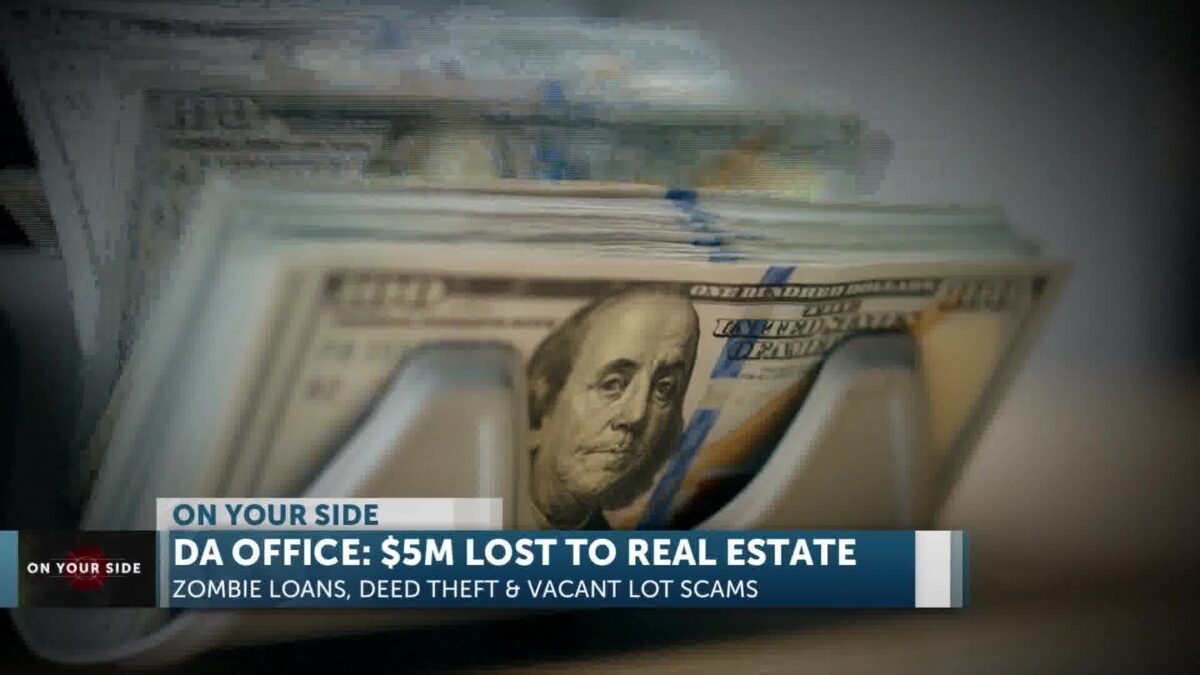Zombie Loans, Deed Theft and Vacant Land Scams: How Fraudsters Target Homeowners

Ryder Christ
SANTA BARBARA, Calif. — Imagine discovering you owe a loan you never knew existed or that someone just sold your land without your knowledge. Local and federal officials are warning that so-called “zombie loans,” deed theft, and vacant lot scams are on the rise, putting homeowners and land buyers at risk.
“Unresolved loans and vacant lot scams are on the rise,” said Kristina Perkins, Chief Investigator with the Santa Barbara County District Attorney’s Office. The DA’s office reviewed more than 50 fraud complaints last year. With limited resources, only 20 could be fully investigated, but financial losses still topped $5 million. Nearly all of the victims were elderly
Zombie loans resurface
So-called “zombie loans” often involve second mortgages or home equity lines of credit that borrowers assumed were resolved years ago. In reality, these debts can linger for more than a decade, resurfacing when debt buyers or collectors see an opportunity to cash in.
Greg Hans, an investigator with the DA’s office, said these debts can sit dormant until property values rise.
“People thought those debts were forgiven. That paper stays out there and may stay dormant for 10 or 15 years. Now that property values have gone up, collectors try to cash in — and sometimes people end up facing foreclosure.”
Consumer advocates warn that collectors have been known to revive old liens with surprise foreclosure threats, sometimes aggressive enough to alarm homeowners. “Some debt collectors, who sat silent for a decade, are now pursuing homeowners on zombie mortgages inflated with interest and fees,” said CFPB Director Rohit Chopra.
Federal law prohibits suing or threatening to sue on debts past the statute of limitations, yet complaints continue to climb. The CFPB logged nearly 110,000 debt-collection complaints in 2023, noting that older, lower-income borrowers and communities of color are disproportionately affected.
Deed theft and title fraud
Another growing concern is title fraud, also known as deed theft. Scammers forge signatures on property deeds and file the fraudulent documents with county recorders, transferring ownership to themselves or shell companies.
“Your home could be stolen, on paper, without you ever knowing,” said Kristina Perkins, Chief Investigator with the Santa Barbara County District Attorney’s Office.
Melinda Green, Chief Deputy Clerk Recorder for Santa Barbara County, emphasized that her office has limited power to stop fraud once documents are presented.
“We’re really just a bulletin board. We are not allowed to investigate the fraud… all we’re doing is looking to see if it fits in the template and we record it. If it doesn’t, we escalate it”.
She explained that even suspicious filings must be accepted if they meet recording requirements:
“If there is some wrongdoing, somebody doesn’t have the rights to record something, it’s not going to be stopped at my point. We’re technically supposed to record it expeditiously”.
Criminals often target vacant homes, rental properties, elderly homeowners, and those who own their properties outright. Sometimes staff notice perpetrators bringing in elderly residents who seem confused, Green said:
“If we have some sense that this person lacks capacity or doesn’t fully understand, we pool our resources with Adult Protective Services, the district attorney, even the FBI”.
Victims usually discover the fraud only when they try to refinance, sell, or suddenly receive a foreclosure notice. The problem isn’t confined to California—New York City alone reported more than 3,500 deed-theft complaints over the past decade.
Vacant lot sales scams
Vacant land has become a lucrative target for impersonation schemes. Scammers often pose as out-of-state owners and push quick below market sales to unsuspecting buyers.
“These bad actors are able to use electronic communications to convince everyone at every level of a property sale that they’re the rightful owner of the property and, therefore, the rightful recipient of the sale proceeds. But they don’t own the property,” explained FBI Special Agent Joe Cardosi.
Investigators say one red flag is when the “seller” insists on an all cash offer and a fast closing, with deals sometimes wrapped up in just weeks. “If somebody asks you to do a real estate transaction all electronically and you never meet the agent, the title company, or the seller, that’s a big red flag,” warned DA Investigator Greg Hans.
The financial stakes are high. The FBI estimates these fraudulent sales can net anywhere from $10,000 to $1 million. A 2024 survey by the American Land Title Association found that 28 percent of title companies encountered at least one impersonation attempt in the prior year, with nearly one in five reporting attempts in April 2024 alone.
How to protect yourself
Experts recommend several steps to avoid becoming a victim:
Verify identity with government-issued ID and check seller information against tax and county records.
Work with reputable title companies and avoid remote closings when possible.
Enroll in county property fraud alert systems, which notify owners if documents are recorded against their property.
Hans also advised homeowners to be proactive.
“You have every right to go online or into the clerk-recorder’s office and look at everything recorded against your property. Even if you’re not comfortable, their staff are very helpful. Or you can hire a real estate attorney or pay $300–$500 for a preliminary title report. It’s not cheap, but it’s better than losing your home”.
Green said her office is proactive in collaborating with prosecutors.
“We are very proactive in providing evidence to the district attorney. While they’re running the investigation, they’re asking us a lot of questions”.
Where to report fraud
Authorities urge anyone targeted by these schemes to report suspicious activity. Unresolved or questionable debts can be reported to the Consumer Financial Protection Bureau. Cases of deed theft or fraudulent land sales should be reported to county recorders, local law enforcement or the district attorney’s office.